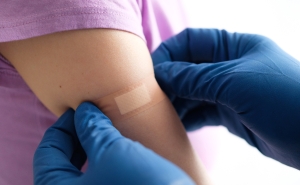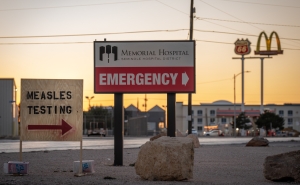
The FDA has issued Emergency Use Authorization for COVID-19 vaccines to be given to children ages 6 months to 5 years.
The authorization comes at a critical time, as omicron’s subvariants continue to fuel a rise in cases.
But, although vaccines for kids ages 5–11 have been authorized since October 2021, only 29% of this age group in the U.S. has been fully vaccinated—compared with 67%–80% of adults—and experts worry uptake will be lacking among the youngest, too.
Vaccinating children has benefits beyond giving the virus fewer people to infect. Here, parent and immunologist Gigi Gronvall, PhD and senior scholar at the Center for Health Security, explains why parents shouldn’t downplay COVID’s seriousness in children—and why it’s important for young kids to be vaccinated.
- It’s likely your child will be exposed to COVID-19 at some point if they haven’t been already. COVID-19 vaccines help prevent kids from getting severely sick and from long-term complications or even death.
While it’s true that young kids tend to have milder or even asymptomatic cases, COVID-19 infections in young children are not nothing; it’s far more dangerous than the flu. During the omicron wave this past winter, children under 5 were hospitalized at five times the rate of previous pandemic peaks. With high amounts of virus circulating right now, getting kids vaccinated as soon as possible can bring some peace of mind.
We’re also learning new things all the time about COVID, and that will continue. Measles, for example, can cause major, even fatal complications to people 20 years after they’ve had it. Time will tell whether having COVID may have similar long-term implications for children, so we want to minimize the risk of infections as much as possible.
- Getting kids vaccinated helps protect everyone.
Although there is evidence that vaccinated people can infect others, they are infectious for a shorter period of time than unvaccinated individuals.
Young kids may be exposed to COVID in daycare or by caretakers and then accidentally expose their grandparents or other high-risk individuals in their lives, especially when there are high levels of transmission of COVID still happening in the U.S.
The bottom line is that even kids under 5 are part of the COVID “chain of transmission.” The more people who are vaccinated, the less transmission will be happening in any community, fewer people will get sick, and there are fewer opportunities for the virus to mutate.
- Vaccinated kids who are exposed to COVID won’t have to do a traditional quarantine.
The CDC recommends that vaccinated kids who are exposed to COVID from close contact wear a mask in public indoor spaces and that their parents seek testing if symptoms arise.
Unvaccinated kids, on the other hand, may be asked to quarantine for 10–14 days after exposure in most cases, which is very disruptive for schools, families, and households.
- Pfizer's three-shot regimen—which is 75-82% effective against COVID, including the omicron variant—means that it will take longer for kids under 5 to be fully vaccinated. Starting sooner is better.
It’s also possible that many schools, camps, and daycare facilities will require vaccinations at some point. Starting now means you’ll be ahead of the game for fall.
- COVID vaccines are safe.
No vaccine in existence has had any side effects more than two months from the point of vaccination. We are way beyond that now for the majority of people who have been fully vaccinated.
- COVID vaccines help prevent myocarditis.
Some parents have cited worries about their child getting myocarditis from the COVID vaccines, but the chances of that happening are much higher if the child gets sick with COVID. Myocarditis remains a very rare side effect and one that can be treated with rest or medication.
- Side effects will likely be milder for kids than for adults.
Kids under 5 are given one-tenth the dosage level for adults in each shot which can minimize side effects while still providing protection. Pfizer said that the three-dose regimen is well-tolerated among kids, and the majority of side effects were mild to moderate.
- This authorization was worth the wait.
In early trials, two doses of the vaccine were only 30%–40% protective, so Pfizer tested the protection gained from a third shot. The data show 75-82% effectiveness from three Pfizer shots against omicron, which is quite strong.
Moderna's two-dose primary series is 51% effective for kids 6 months to 2 years old, and only about 37% effective for kids aged 2-5. They are currently testing the efficacy of adding a third shot, and more data should be available on that soon.
- COVID shots often hurt less than the flu shot.
Kids under 5 get one-tenth of the adult dose of the vaccine, which means less liquid. COVID shots are incredibly quick and hurt less than other vaccines that contain more fluid.
- Parents of young kids can finally have some peace of mind.
Throughout the pandemic, families have had to navigate the difficulties of having “mixed-vaxxed households.” Once everyone is fully vaccinated, hopefully less illness overall will mean fewer disruptions and fears.
Lindsay Smith Rogers, MA, is the producer of the Public Health On Call podcast and the associate director of content strategy for the Johns Hopkins Bloomberg School of Public Health.





